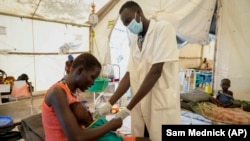The joint report by the Food and Agriculture Organization, the UN children's fund UNICEF and the World Food Program said "hunger and malnutrition are on the rise across... South Sudan, with some communities likely to face starvation if humanitarian assistance is not sustained and climate adaptation measures are not scaled-up."
The report said the proportion of people facing high levels of food insecurity and malnourishment "is at the highest level ever", surpassing levels seen even during the conflict in 2013 and 2016.
It said 7.76 million people are likely to face acute food insecurity during the April-July 2023 lean season while 1.4 million children will be malnourished.
The report blamed a combination of conflict, poor macroeconomic conditions, extreme climate events, and spiraling costs of food and fuel as well as a decline in funding for humanitarian programs.
Makena Walker, acting country director for WFP in South Sudan, said in a statement "South Sudan is on the frontlines of the climate crisis and day in, day out families are losing their homes, cattle, fields and hope to extreme weather," Walker said.
"Without humanitarian food assistance," she added, " millions more will find themselves in an increasingly dire situation and unable to provide even the most basic food for their families."
Last month, the UN's emergency response agency OCHA said around 909,000 people have reportedly been affected by flooding in South Sudan, as torrential rains ravage crops and destroy homes.
That has lowered food supplies as well as making it more difficult for relief to reach areas of the country where it is desperately needed.
